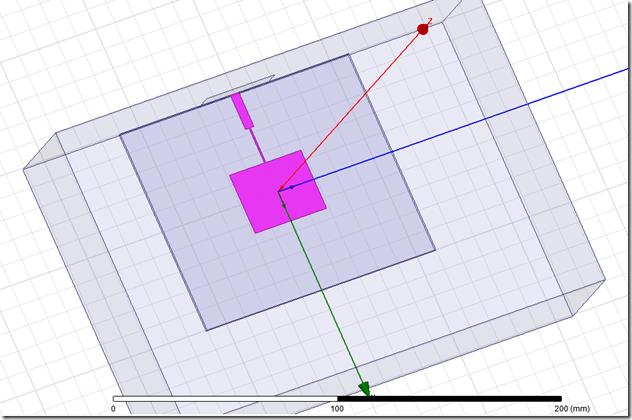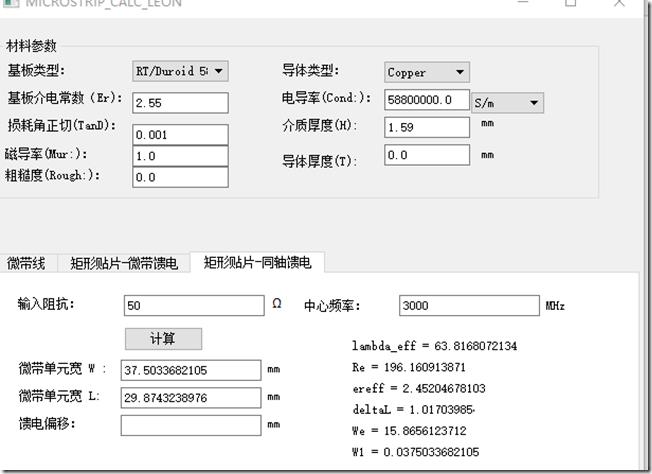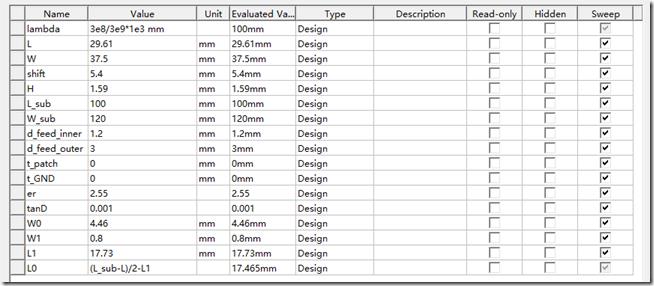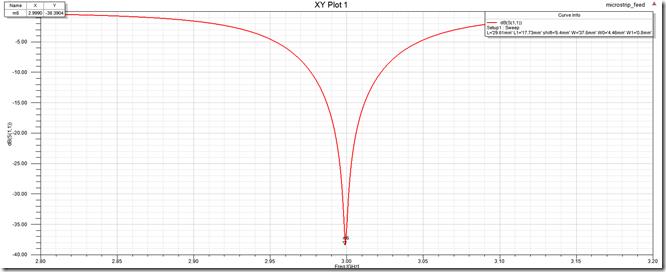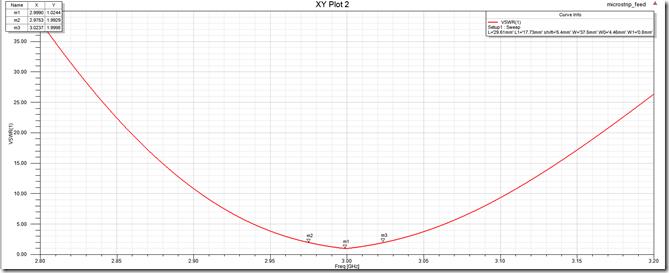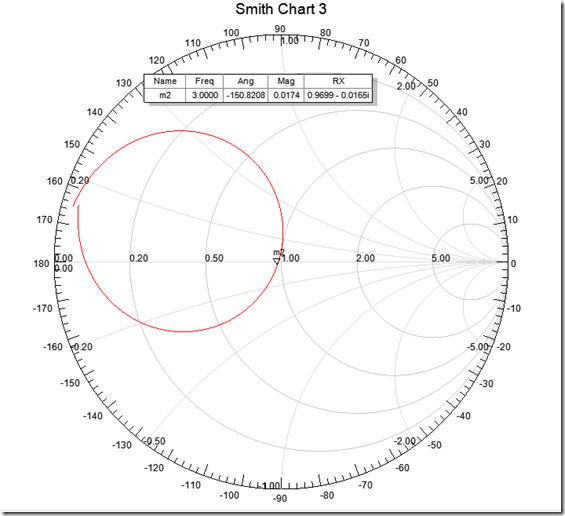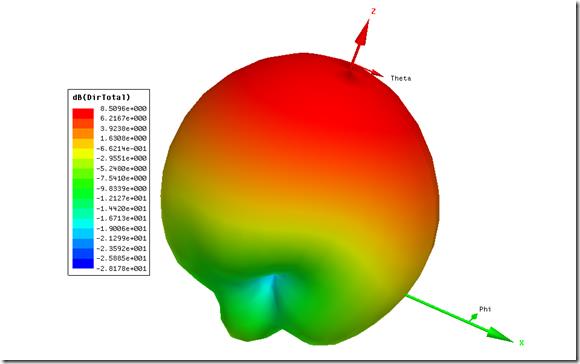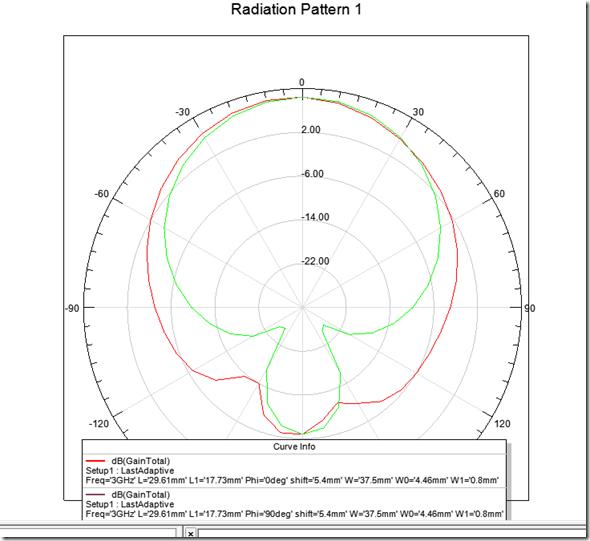微带贴片天线-微带线馈电
Posted Tequila Sunrise
tags:
篇首语:本文由小常识网(cha138.com)小编为大家整理,主要介绍了微带贴片天线-微带线馈电相关的知识,希望对你有一定的参考价值。
模型如下:
设计参数同http://www.cnblogs.com/hiramlee0534/p/6283543.html基板参数er = 2.55, H = 1.59mm, 导体为PEC,厚度为0,频率为3GHz, 使用公式计算得到辐射边W=37.503mm。长度与谐振频率有关,使用微带线馈电,连接在辐射一端。计算好天线阻抗,输入端为50 欧姆微带线,中间是1/4波长阻抗变换微带线。计算设计初值 如下
1 def msa_coax_synthesis(self): 2 #er = float(self.lineEdit_ms_er.text()) # relative dielectric constant 3 h = float(self.lineEdit_ms_H.text())/1.0e3 # substrate thickness 4 #w = float(self.lineEdit_ms_W.text())/1.0e3 # conductor width 5 #l = float(self.lineEdit_ms_L.text())/1.0e3 # conductor length 6 er = float(self.lineEdit_ms_er.text()) # relative dielectric constant 7 mur = float(self.lineEdit_ms_mur.text()) # relative permeability 8 fc = float(self.lineEdit_msa_coax_fc.text())*1e6 # frequency in Hz 9 rough = float(self.lineEdit_ms_rough.text())/1.0e3 10 tand = float(self.lineEdit_ms_loss_tangent.text()) # loss tangent of the dielectric 11 cond = float(self.lineEdit_ms_conductivity.text()) 12 mu = mur*4*math.pi*1.0e-7 13 Rc = float(self.lineEdit_msa_coax_Rin.text()) 14 t = float(self.lineEdit_ms_T.text())/1.0e3 15 lambda0= self.c/fc #m 16 msa_w = self.c/2.0/fc*math.sqrt(2.0/(er+1.0)) # patch width m 17 U = msa_w/h # ratio of trace width to substrate thickness 18 if t > 0: 19 T = t/h #ratio of conductor thickness to substrate thickness 20 #(T/PI)*log(1.0 + 4.0*exp(1.0)/(T*pow(coth(sqrt(6.517*u)),2.0))) 21 U1 = U +(T*math.log(1.0+4.0*math.e/T/math.pow(1.0/math.tanh(math.sqrt(6.517*U)),2.0)))/math.pi # from Hammerstad and Jensen 22 # 0.5*(1.0 + 1.0/cosh(sqrt(er-1.0)))*deltau1 23 Ur = U +(U1-U)*(1.0+1.0/(math.cosh(math.sqrt(er-1))))/2.0 # from Hammerstad and Jensen 24 else: 25 U1 = U 26 Ur = U 27 # Y = self.ee_HandJ(Ur,er) 28 # Z0 =self.z0_HandJ(Ur)/math.sqrt(Y) 29 # #ereff0 = Y*math.pow(Z01_U1/Z01_Ur,2) 30 # ereff0 = Y*math.pow(self.z0_HandJ(U1)/self.z0_HandJ(Ur),2.0) 31 if t > 0: 32 W1 = msa_w +(t/math.pi)*(1+math.log(4.0/math.sqrt(math.pow(t/h,2)+math.pow(1.0/math.pi,2)/math.pow(msa_w/t+1.1,2)))) 33 else: 34 W1 = msa_w 35 F = 6.0 + (2.0*math.pi-6.0)*math.exp(-4*math.pow(math.pi,2)/3.0*math.pow(h/W1,0.75)) 36 We = 2*math.pi*h/math.log(h*F/W1+math.sqrt(1+math.pow(2*h/W1,2))) 37 A = 1.0 + (1.0/49.0)*math.log((math.pow(U,4.0) + math.pow((U/52.0),2.0))/(math.pow(U,4.0) + 0.432))\\ 38 + (1.0/18.7)*math.log(1.0 + math.pow((U/18.1),3.0)) 39 #Ber = 0.564*math.pow((er-0.9)/(er+3),0.053) 40 B = 0.564*math.exp(-0.2/(er+0.3)) 41 #Y = (er+1.0)/2.0+(er-1.0)/2.0*math.pow(1+10.0/Ur,-(A*B)) 42 G= math.pow((1.0 + 10.0/U),(-A*B))-math.log(4)*t/math.pi/math.sqrt(msa_w*h) 43 ereff0 = 0.5*(er+1.0+(er-1.0)*G) 44 fn = fc/1e9*h*1e3 45 u = (msa_w+(W1-msa_w))/h 46 P1 = 0.27488 + (0.6315 + (0.525 / (math.pow((1 + 0.0157*fn),20))) )*u - 0.65683*math.exp(-8.7513*u) 47 P2 = 0.33622*(1 - math.exp(-0.03442*er)) 48 P3 = 0.0363*math.exp(-4.6*u)*(1 - math.exp(-math.pow((fn / 38.7),4.97))) 49 P4 = 1 + 2.751*( 1 - math.exp(-math.pow((er/15.916),8))) 50 P = P1*P2*math.pow(((0.1844 + P3*P4)*fn),1.5763) 51 ereff = (er*P+ereff0)/(1+P) # equavlent ralative dielectric constant 52 #ereff = (er+1.0)/2.0+(er-1.0)/2.0*math.pow(1+12/U,-0.5) 53 A1 = 0.434907*(math.pow(ereff,0.81)+0.26)/(math.pow(ereff,0.81)-0.189)\\ 54 *(math.pow(U,0.8544)+0.236)/(math.pow(U,0.8544)+0.87) 55 A2 = 1+ math.pow(U,0.371)/(2.358*er+1) 56 A3 = 1 + 0.5274*math.atan(0.084*math.pow(U,1.9413/A2))/math.pow(ereff,0.9236) 57 A4 = 1 + 0.0377*math.atan(0.067*math.pow(U,1.456))*(6-5*math.exp(0.036*(1-er))) 58 A5 = 1 - 0.218*math.exp(-7.5*U) 59 deltaL = h*A1*A3*A5/A4 60 #deltaL = h*0.412*(ereff+0.3)*(U+0.264)/(ereff-0.258)/(U+0.8)#mm 61 lambda_eff = self.c/fc/math.sqrt(ereff)#mm 62 msa_l = lambda_eff/2-2*deltaL #patch length mm 63 k0 = 2.0*math.pi/(lambda0) 64 keff = k0*math.sqrt(ereff) 65 66 Sw = math.pow(self.c,2)/(4*math.pow(fc,2)*(ereff-1)) 67 Pw =math.pow(msa_w/3.0,3)+(Sw/2.0)*(We-msa_w/3.0) 68 Qw = Sw/3.0 -math.pow(msa_w/3.0,2) 69 Rw = math.sqrt(math.pow(Pw,2)+math.pow(Qw,2)) 70 W2 = We 71 We = msa_w/3.0+math.pow(Rw+Pw,1.0/3.0)-math.pow(Rw-Pw,1.0/3.0) 72 Rr = math.pow(k0*We,2)/6.0/(60+math.pow(k0*We,2)) 73 Gr = 1.0/Rr 74 75 l = keff*(msa_l+deltaL) 76 p = keff*deltaL 77 Fg = special.j0(l)+math.pow(p,2)/(24-math.pow(p,2))*special.jn(2,l) 78 Gm = Gr*Fg 79 Re = 1.0/(2*(Gr)) 80 G1 = msa_w/120.0/lambda0*(1-math.pow(k0*h,2)/24) 81 G12 = integrate.quad(lambda x: 1.0/120.0/math.pow(math.pi,2)*math.pow(math.sin(k0*msa_w/2.0*math.cos(x))/math.cos(x),2)*special.j0(math.sin(x)*msa_l*k0)*math.pow(math.sin(x),3), 0, math.pi) 82 #Re = 1.0/2.0/(G1) 83 Re = 1.0/2.0/(G1-G12[0]) 84 # shift = msa_l/math.pi*math.asin(math.sqrt(Rc/Re)) 85 self.lineEdit_msa_coax_w.setText(str(msa_w*1.0e3)) 86 self.lineEdit_msa_coax_l.setText(str(msa_l*1e3)) 87 self.label.setText(str(\' lambda_eff = \')+str(lambda_eff*1.0e3)) 88 self.label_test.setText(str(\' Re = \')+str(Re)) 89 self.label_test_2.setText(str(\' ereff = \')+str(ereff)) 90 self.label_test_3.setText(str(\' deltaL = \')+str(deltaL*1.0e3)) 91 self.label_test_4.setText(str(\' We = \')+str(We*1.0e3)) 92 self.label_2.setText(str(\' W1 = \')+str(W1))
优化后参数如下
得到仿真结果:
S11
VSWR
输入阻抗
三维方向图
E面和H面方向图
以上是关于微带贴片天线-微带线馈电的主要内容,如果未能解决你的问题,请参考以下文章
雷达通信基于matlab粒子群算法优化综合微带天线阵列方向图含Matlab源码 1967期
微带天线读书计划:MICROSTRIP AND PRINTED ANTENNAS by Debatosh Guha in 2011
